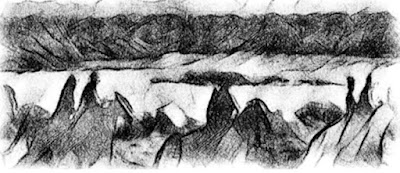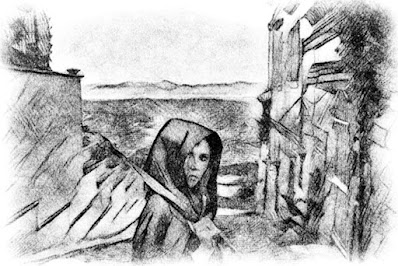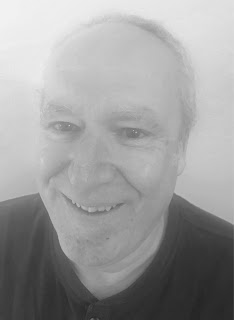Genonn's tired and dreams of a remote roundhouse in the Cuala Mountains. However, sudden rebellion in Roman Britain destroys that dream because the Elder Council task him with delivering Lorg Mór, the hammer of the Gods, to the tribes across the straits of Pwll Ceris. Despite being torn between a waning sense of duty and his desire to become a hermit, Genonn finally agrees to help. When his daughter follows him into danger, it tests his resolve.
I'm pleased to welcome author Micheál Cladáin to The Writing Desk:
Tell us about your latest book
Hammer is a tale that combines Irish mythology with Romano-British history. It comprises two POVs, Genonn the seeker (once a druid) and Agricola, a banded tribune seconded to the staff of the governor of Britannia, Gaius Suetonius Paulinus.
It is 60 or 61 years after Christ was born, about twenty years after the Battle of Gairech, where Queen Medb of Connacht and King Conchobar of Ulster fought over the Brown Bull of Cooley. I cover the story extensively in Milesian Daughter of War, August 2020. Boudica is about to rebel in the east of Britannia. The druid Elder Council on Mona (Anglesey) tasks Genonn with delivering the hammer of the Gods, Lorg Mór, to the queen to aid the warriors of the rebellion. Few believe the hammer is magical, but the Elders believe in the power of its symbology. To protect Genonn, the council leader Fedelm, Genonn’s wife, sends the warrior Oengus with him. Oengus is wanted for murder, but Fedelm believes him innocent.
Roman Cavalry at the fords of Pwll Ceris
On the other side of the fords at Pwll Ceris, Agricola is suspicious of his commander’s behaviour. They suspect an uprising is imminent, but Suetonius orders the Fourteenth Legion west, away from where the rebels are likely to strike.
What is your preferred writing routine?
I am a full-time writer, so I treat my day as though I am at a nine-to-five job in Dublin. I leave for the office at eight in the morning, kiss the wife goodbye and pat the dogs on the head before a gruelling five-second walk to the office.
I go over what I wrote the previous day. Take a break and then spend five or six hours writing new material or planning a new book. I take a one-hour lunch break where I go to the gym and spend the last couple of hours each day either researching or trying to plug my books.
What advice do you have for aspiring writers?
I am often asked this question, and my answer never varies. Do not give up. Other cliches are associated with it: read a lot, write a lot, and the Urban myths, like Tolkien submitted The Lord of the Rings 129 times before he got a publisher. Today’s publishing world differs entirely from when Tolkien fought to be heard. I was at a Nielsen conference recently, where the presenter gave us the stat that 60 000 books are published each week globally. That news is a sobering thought.
How can anyone compete in that market? One answer is to stand out from the crowd. Have a USP. In today’s market, quality is a unique selling point. Most of the novels released today are not edited. I am not restricting that statement to self— and Indie-published works. I read several traditionally published books in 2022, most of which had not been edited, even by reputable publishers like Penguin Random House.
So, my top tip, get your books edited by a professional. That will make sure they stand out.
We writers need to be aware that self-editing does not work. I am a professional editor and still have my books edited by someone else. The reason? The mind reads what it expects to see and not what is written. This is true of all reading but exaggerated when reading your own works. We’ve all seen those texts where the letters are anagrammed with the statement, “if you can read this, you’re a genius”, which is nonsense. What is happening is your mind is deciphering the words and giving you the answer. This occurs whenever we read.
What have you found to be the best way to raise awareness of your books?
This is a difficult one. There are tried and tested methods that everyone cites: get a mailing list, run ads on Facebook and Instagram, and Tweet continually. Get a large social media following. My books are published by a small Indie publisher based in Wexford, PerchedCrowPress, and they do not have the same budget as large publishing houses. I would hire a publicist to plug my work if I had the budget.
Without a sizeable budget, I have found book promotion to be the most challenging part of being a novelist. However, the feel-good stories are there. I recall reading about a book (which might have been Mortal Engines by Phillip Reeve) that languished until it was noticed by “a name” in the steampunk world, after which it took off.
Tell us something unexpected you discovered during your research
I read classical studies at Uni, so what I read in prep for Hammer is information I have researched many times before. As such, I am not sure I “discovered” anything unexpected during my research. I think I did put an interpretation on the Boudiccan uprising that I have not hitherto done. I won’t reveal it here because it would be a massive spoiler.
What was the hardest scene you remember writing?
I always find the first and the last scenes challenging to write. Can I say the hardest? I don't think I can. My writing methods are systematic, so the most challenging part of writing for me is creating a scene plan. Once that is done, the actual writing is quite a stress-free process.
What are you planning to write next?
I am working on Iron, the second book in The Iron Between trilogy (Hammer, Iron, Anvil). I am in the planning stage. The only thing I know so far is that it all starts with Agricola catching sight of a woman through a foggy morning in Rome who he thinks is Clíodhna, Genonn’s daughter.
Micheál Cladáin
# # #
About the Author
Micheál Cladáin has been an author for many years. He studied Classics and developed a love of Greek and Roman culture through those studies. In particular, he loved their mythologies. As well as a classical education, bedtime stories consisted of tales read from a great tome of Greek Mythology, and Micheál was destined to become a storyteller from those times. Find out more from his website: www.philhughespublishing.com and find him on Facebook and Twitter @cladain_m





Thank you so much for hosting Micheál Cladáin today, Tony. A very interesting interview. x
ReplyDelete